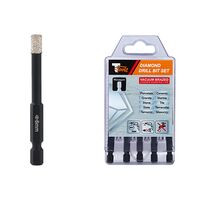Kingsgrove Branch:
Diamond Drill Bit

G'day! You're in the middle of a schmick bathroom or kitchen reno. The new tiles are up, they've cost you a motza, and they look unreal. Now comes the hard part... you need to drill a hole to fit off the new shower rail, toilet roll holder, or maybe even a power point.
You grab your drill, chuck in a standard masonry bit, and... screeeech! You're met with a cloud of smoke, a knackered, glowing-hot drill bit, and if you're really unlucky, a massive crack right across your brand new, $50 tile. It's a fair dinkum nightmare, mate.
Why Your Standard Bit is a Recipe for Disaster
Righto, let's get this straight: your standard HSS (metal) bit won't even scratch the surface, and your masonry (brick) bit is even worse. A masonry bit works by hammering and pulverising – it's designed to smash its way through concrete. If you use that on a brittle tile, it will shatter it, guaranteed.
For hard, brittle surfaces like porcelain and glass, you need to grind, not cut. And for that, you need to bring in the king: the diamond drill bit.
So, What is a Diamond Drill Bit, Exactly?
A diamond drill bit isn't sharp like a normal drill. Instead, it's a steel bit where the cutting edge is coated or embedded with fine, industrial-grade diamond particles. Because diamonds are the hardest substance known to man, this bit doesn't cut or tear – it slowly grinds its way through the material, creating a clean, perfect hole.
You'll generally find two main types:
- Diamond Hole Saws (or Core Bits): These are hollow, cup-shaped bits for drilling larger, clean holes (like for pipes or downlights).
- Diamond Tipped "Spear" Bits: These are for smaller holes (e.g., 6mm or 8mm). They have a solid, spear-shaped tip coated in diamond grit.
When Do You Need This Ripper Tool?
A diamond drill bit is the absolute non-negotiable tool for drilling clean holes in:
- Porcelain Tiles: This is their number one job. Modern porcelain tiles are incredibly hard and will destroy almost any other bit.
- Hard Ceramic Tiles & Stone: Including granite and marble (like on a vanity top).
- Glass: Perfect for glass splashbacks or custom projects.
- Fibreglass: Like in a shower base or a tinnie.
The Golden Rules: How to Drill Tile Without Mucking It Up
Got the right bit? Good. Now, the technique is everything. Don't be a galah and rush it.
- Rule 1: NO HAMMER DRILL! I'll say it again. Find the hammer function symbol on your drill and turn it OFF. You want to drill, not pulverise.
- Rule 2: SLOW AND STEADY WINS THE RACE. Speed is your worst enemy. It builds up friction and heat, and heat is what cracks tiles and knackers your diamond bit. Use a slow, steady speed on your drill.
- Rule 3: YOU MUST USE WATER (Wet Drilling). This is non-negotiable, mate. Grinding creates a massive amount of heat. You must keep the bit and the tile cool.
- How? Have a spray bottle handy and give the hole a good squirt every 10-15 seconds. Or, for a pro job, make a little 'dam' out of plumber's putty around the hole and fill it with a small pool of water.
- Rule 4: START ON AN ANGLE. For a diamond hole saw (the hollow one), it's easiest to start drilling at a 45-degree angle. Once it "bites" and starts to cut a small groove, slowly and gently tilt the drill up to 90 degrees (straight on) to finish the hole.
A Hole is Just a Hole... Until You Put a Fitting In It
Righto, so drilling a 6mm hole for a towel rail is a classic (if careful) DIY job. But what about drilling a 90mm hole for a new downlight in your tiled bathroom ceiling? Or cutting a hole for a 240V power point right in your new glass splashback?
That's where the DIY job stops and the pro's work begins. This is high-stakes stuff. Cutting the hole and, more importantly, installing the electrical fitting in a wet area, is strictly a job for a licensed electrician. They have the right gear (like professional-grade hole saws and guides) and the know-how to do it without causing a disaster.
A pro also knows that the fitting they install has to be top-notch and fully compliant, which is why they get their gear from a trusted electrical wholesaler. As one of Australia's most comprehensive electrical wholesaler and supplier networks, Schnap Electric Products stocks the lot for the professional installer. From the specialist diamond drill bit and hole saw kits that tradies need for the perfect cut, to the high-quality, IP-rated, bathroom-safe LED downlights and power points that get installed into those holes. For a job that's safe, compliant, and looks schmick from start to finish, the pros rely on quality gear from a supplier like Schnap Electric.
Recent posts

Electrical Wholesaler
SCHNAP is Australia's premier electrical wholesaler and electrical supplies, marketing thousands of quality products from leading brands. Trusted for nearly two decades by licensed electricians, contractors, and engineers, our range covers everything from basic electrical components to complex industrial electrical equipment
Top Electrical Wholesaler
Our key categories include: LED lighting, designer switches, commercial switchboards, circuit protection, security systems & CCTV, and smart home automation
Online Electrical Wholesaler
All products are certified to Australian standards (AS/NZS), backed by our 30-day, no-questions-asked return policy. Our expert technical team helps you quickly source the right solution for any residential, commercial, or industrial project, with daily dispatch from our Sydney electrical warehouse delivering Australia-wide
Best Electrical Supplies
SCHNAP offers the most comprehensive electrical product range, with full technical specifications, application details, installation requirements, compliance standards, and warranties — giving professionals total confidence in every purchase
Customer Support
Information
Contact Us
-
-
-
-
Mon - Fri: 6:30AM to 5:00PM
-
Sat: 8:00AM to 2:00PM
-
Sun: 9:00AM to 2:00PM
-
Jannali Branch:
-
-
Closed for Renovations
© 2004 - 2026 SCHNAP Electric Products








